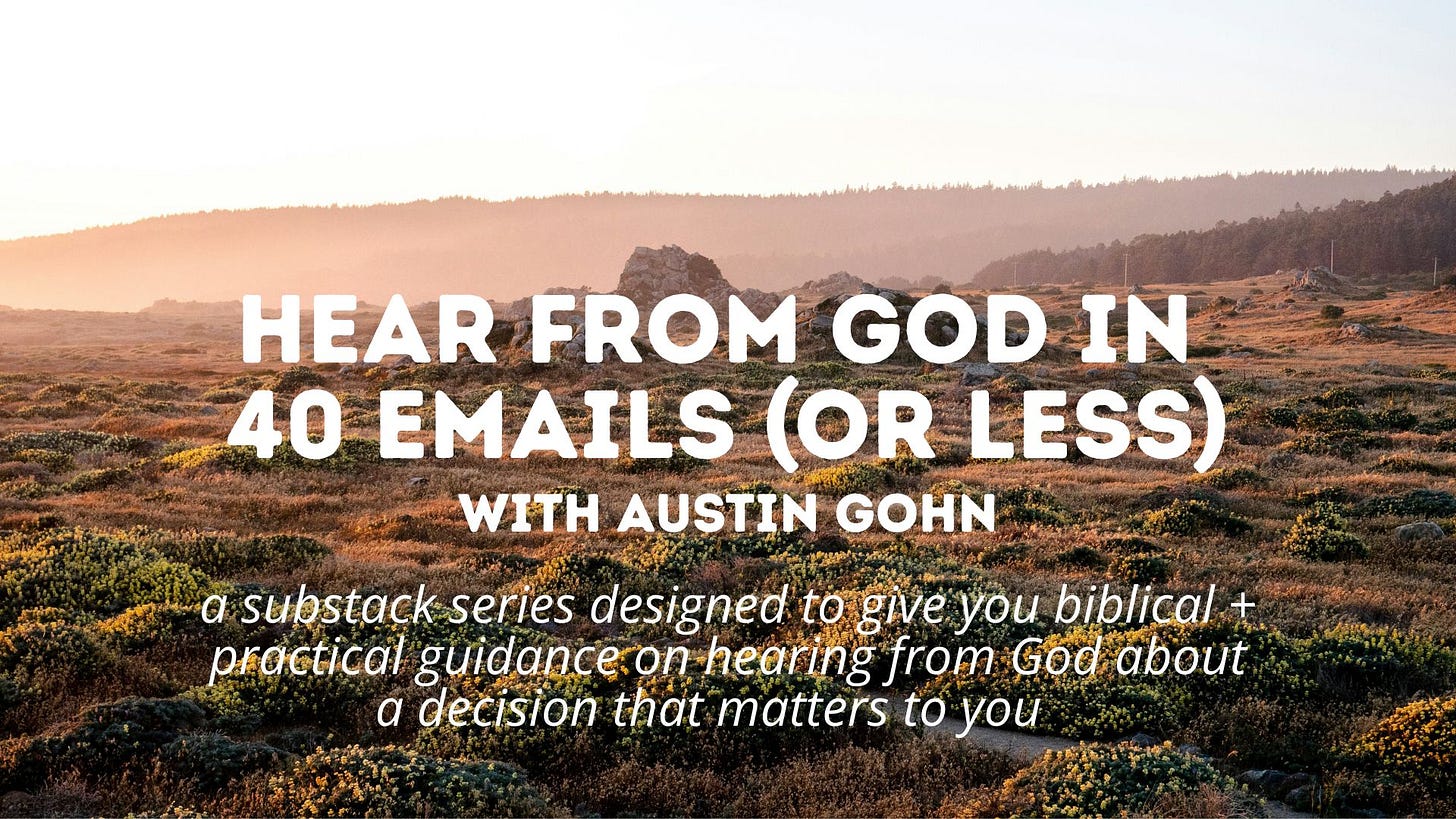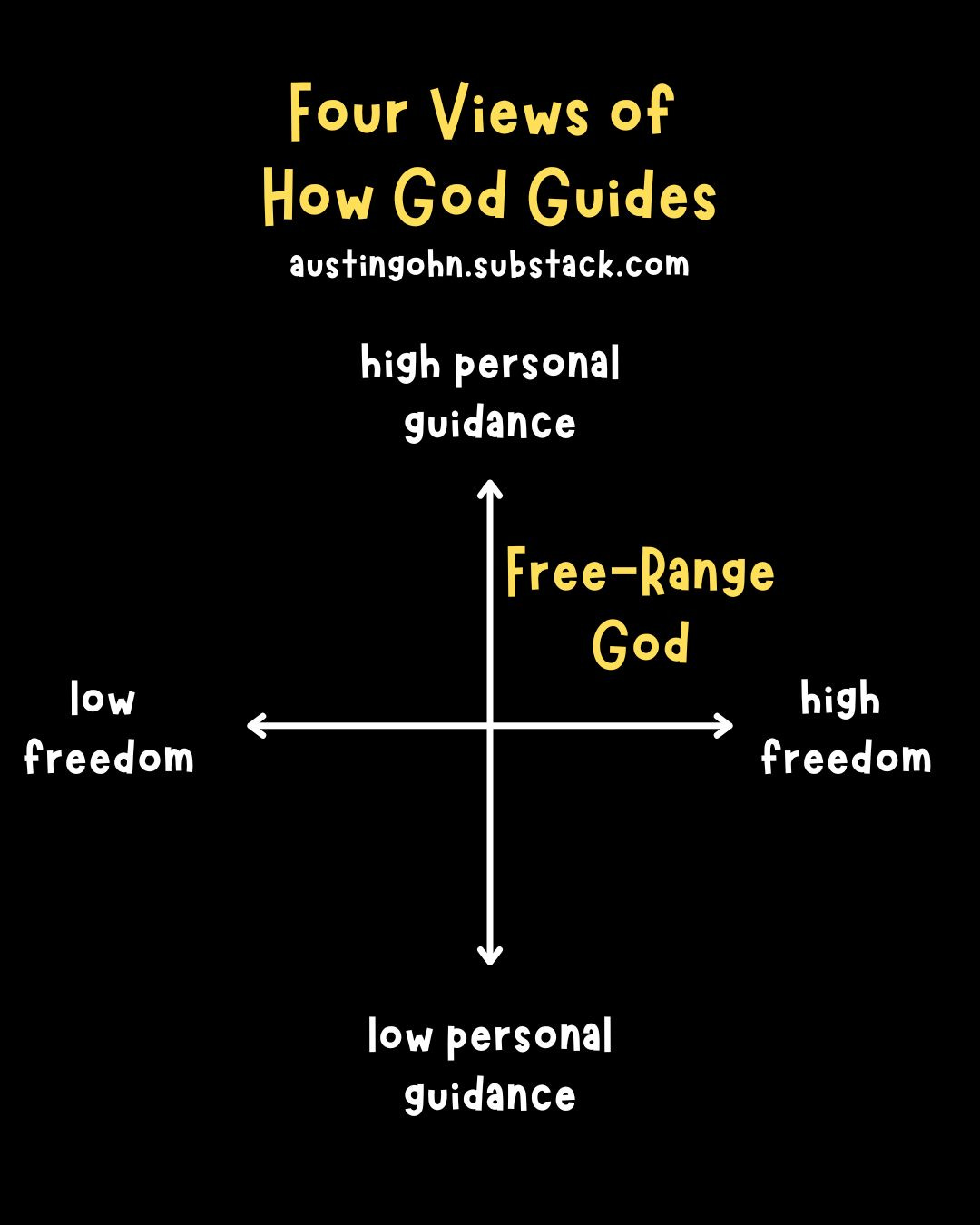(09/40) What God and Free-Range Parents Have in Common
Is social psychologist Jonathan Haidt onto something?
As part of Hear from God in 40 Emails (or Less), we’re exploring the four views of how God guides us: absentee God, helicopter God, cool God, and free-range God. You can read the introduction here.
I have three children who all love the play.
Imagine that, while I’m trying to cook dinner, I tell them, “Please, go find something to do while I finish up here.”
The oldest goes outside to build a fort in the backyard out of some discarded wood. He knows that he’s not allowed to go beyond the fence, but fort-building in the yard is just fine. At some point, he asks me where I put the rope he had bought at the store, and I make a few suggestions about where he might be able to find it.
The middle one goes upstairs to make something out of LEGO bricks. She just has to remember not to put bricks in her mouth, which we’ve told them quite a few times not to do. She can follow an instruction booklet if she wants or just build something new from scratch. She asks me for an idea about what to build, and I give her a few.
The youngest stays downstairs in the living room and flips through a board book. He’s a bit younger than the others, and he can’t be trusted near the markers yet. Every few minutes, I peek around the corner to make sure he’s doing okay. He’s reading the book upside-down, but he’s trying his best.
All three of my kids are doing something—just like I asked. They’ve found something to do within my “general will” for them at that moment (as long as they aren’t disobeying any of our clearly articulated family rules), and I’ve also provided some more “specific guidance” to each of them as it was helpful to do so.
Dallas Willard, in Hearing God, says this seems to be the model for how God operates in our lives most of the time—based on the range of both the biblical evidence and human experience.1
In other words, he’s a free-range God.
What Free-Range Means (And Doesn’t Mean)
When you think of free-range parents (and a free-range God, for that matter), you might be thinking of parents who let their kids do whatever they want—some kind of lousy hybrid between the absentee parent who is uninvolved and the cool parent who is overly permissive, all in the name of the latest parenting fad.
But, at their best, free-range parents take time to show their kids the boundaries, give them some hard and fast rules, train them in the age-appropriate skills they need, focus on the development of character, instill some deep values, and give them room to play with minimal interference—even if they get hurt every once in a while.
And, more often than not, the free-range parent is a shout away and ready to give guidance (or, at least ask the right questions) as needed.
As social psychologist Jonathan Haidt has pointed out in The Anxious Generation, free-range (at its best) seems like the style of parenting that the kids desperately need—and, I think, it’s closest to the style of guiding that God has always done.
The Free-Range God says to us, “Here’s the boundaries. Now, go play. You know what’s allowed and not allowed. I’ll be right here, though, so just shout if you need me, and I’m more than happy to help.”
On the grid, the Free-Range God is high on both freedom and personal guidance—the best of each part of the grid without any of the worst. God lays out the various guidelines for how to live in the Bible and gives you room to make wise decisions in many of the various situations in which you find yourself—while also speaking more specifically into your life and nudging you in certain directions as its helpful.
Three Facts About the Free-Range God
With this view of God in mind, let’s consider what that means for how we experience his guidance in our lives—and how that differs from the other views of God we’ve explored in the past few emails:
The Free-Range God gives you as many boundaries as are essential. Unlike the Cool God, there’s still some black and white rules as well as guiding principles that God gives us in the Bible. There are plenty of examples in the Bible of God doing this (e.g., “The Ten Commandments”), and the Bible—as a whole—forms the boundaries on what God might be saying to us at any given moment and, in many situations, he’s already said all that needs to be said.
The free-range God gives you as much freedom as is advisable. Within those boundaries, though, most of the time God gives you lots of freedom in your day-to-day life to make wise decisions about how you’re going to spend your time, who you’re going to hang out with, and what you’re going to order for lunch—unlike the Helicopter God. As the writer of Psalm 119 says, “I will walk freely in an open place because I study your precepts” (119v45). In other words, there’s freedom within the fence.
The free-range God gives you as much guidance as is helpful. Unlike the Absentee God, he’s still available to guide you more specifically—both in direct and indirect ways. As we explored in an earlier post, there are plenty of examples in the Bible of God doing this. And, how precisely God personally guides us is what the rest of this Substack series is all about.
When you read the Bible from cover to cover, this is the view of God that emerges—and, in particular, in the life of the Apostle Paul.
Paul saw God as a free-range God.
Paul was deeply familiar with what God had already spoken in the Scriptures—having studied and memorized large portions of it. He often found himself writing Spirit-inspired letters to churches teaching them how to live wisely within those boundaries in the various situations they found themselves—as he was trying to do so himself. And, as his journeys make clear, Paul was following the personal guidance of the Holy Spirit wherever he led as God nudged him in one direction or the other.
What Comes Into Your Mind When You Think of God?
As I said in an earlier email, your view of God is probably the single most significant factor in your experience of hearing from God in day-to-day life. So, as A.W. Tozer asks, what comes into your mind when you think of God?
Is God like an Absentee God who leaves you with nothing but the Bible?
Is God like a Helicopter God who hovers over your every move and provides constant guidance to you?
Is God like a Cool God who lets you do whatever you want because he just wants you and your friends to like him?
Or, is God more like a Free-Range God who has given you clear biblical guardrails, left space for you to practice wisdom in most situations, and is ready to provide more specific guidance as it's helpful?
Once you’ve clarified your view of God, you’re ready for the five steps that will prime you to hear God speak—and that's what we’re exploring next.
Miss a post? Get caught up here. Or, start with the first email.
Dallas Willard, Hearing God, 13.







I love this description of God, and this approach to parenting guidance. The only thing I'd add is that our relationship with God--and with our children--goes far beyond boundaries, freedom, and even guidance. I'm one of those children of God who at least appears to operate decently well within the guidelines given, but I can easily forget that God isn't only there if I need Him; He's there all the time, delighting. I may not need to ask Him about every little step, and He's not a control freak, but He takes an interest in my "play."